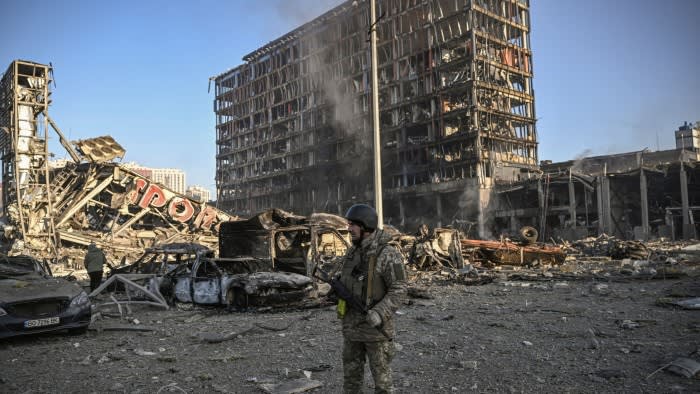
Unlock the Editor’s Digest for free
Roula Khalaf, Editor of the FT, selects her favourite stories in this weekly newsletter.
The writer is the author of ‘When nations can’t default: A history of war reparations and sovereign debt’
Of the potential geopolitical flashpoints in 2024, one for investors to watch may be the pressure to seize Russia’s reserves in foreign central banks to fund Ukraine.
Western nations were reported last month to have been actively exploring the move as political resistance in the US and elsewhere grows to increasing direct financial support to Ukraine in its fight against invading Russia.
Seizing the assets has raised worries about the consequences for the financial system, namely that some countries such as China might come to fear that reserves held in euros or dollars were no longer safe. But they shouldn’t. If countries don’t illegally invade other countries, their money is quite safe.
The EU and the US should take Russia’s frozen assets and give them to Ukraine. It is the right thing to do and there are historical precedents for both confiscating foreign assets during a time of war and allocating war reparations claims after.
A classic problem of sovereign finances is how to enforce any such agreement. Allocating Russia’s already frozen money to Ukraine would sidestep any problem of enforceability.
War reparations are common in peace settlements. When a state violates international law, the injured party can claim reparations as an established norm under customary international law. The historical norm goes back much further, at least as far as the peace settlement after the first Punic war in 241BC.
Russia has engaged in an illegal war of aggression, which means that Ukraine is justified in claiming monetary compensation for restitution and compensation, as well as “satisfaction” such as an acknowledgment of its crimes in the form of an apology. The latter seems unrealistic, so let’s focus on the monetary compensation.
The normal historical procedure since the Napoleonic wars has been to set up a reparations commission, which is governed by a peace treaty. Citizens, businesses, and the state can claim restitution and compensation for destroyed property or ask for acknowledgment of its violations.
In Ukraine’s case, there is already a register of damages hosted by the KSE Institute, which as of June 2023 has an estimated loss of more than $250bn, stemming from damages to real estate and infrastructure, as well as economic loss from engaging in a full-scale war. Would a reparations transfer of this size be within the historical norm? The answer to that is yes.
Since the 19th century, most successfully repaid transfers were about 25 per cent of the gross domestic product of the country involved. Russian GDP is estimated by the IMF to be $1.9tn in 2023, so even if we chose a conservative 20 per cent of GDP, that is $380bn in war reparations based on historical standards. It is difficult to get exact figures for how much of Russia’s money is frozen in Europe and the US but most estimates are around $300bn.
The largest transfer that was repaid followed the Gulf war, where Iraq made some $52.4bn in war reparations that were paid off only in 2022. Haiti, Germany, France, and Finland have all paid significant damages over the last 200 years. The difference is that the money was transferred after wars, but a peace settlement does not seem likely with the current political regime in Moscow, which makes confiscation a good solution.
And confiscating assets of foreign states in response to an unjust war has been normal practice throughout history. During first world war, the US passed the Trading with the Enemy Act, which allowed for the confiscation of enemy property. Japanese and German assets were frozen during second world war and were later used to settle claims after the war. In 1991, President George Bush signed an executive order that transferred Iraqi funds held in US banks that would later help pay Iraq’s war reparation while Iraqi assets were again seized in 2003 under the Patriot Act.
A similar exercise could take place today. The UN has already recognised that Russia should bear the legal consequences of its war, which includes reparations. Under international law, the EU and the US are justified in enforcing state countermeasures to confiscate Russian assets and use them to pay its debt.
Settlements of damages are always a matter of realpolitik of course. But if countries want to be part of global society, there is an obligation to adhere to international laws and norms. Russia’s blatant violations of international laws require a response, and investors should be comforted that rules are enforced.


